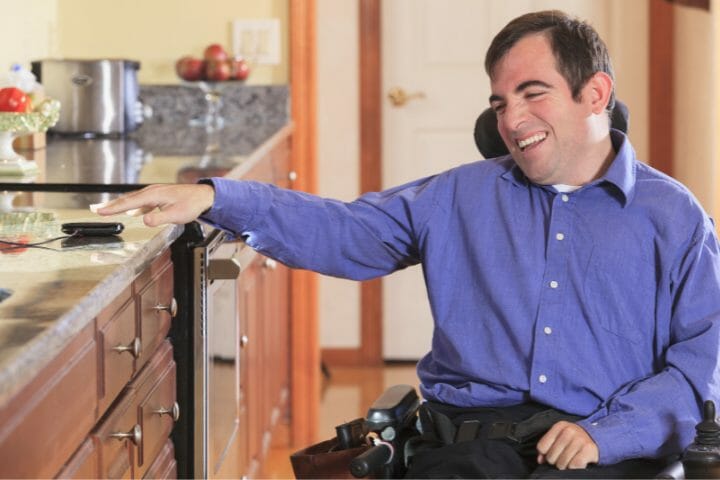Age can worsen disability, or create new ones. But are there any special rules for disability over 50? Is it easier to win a disability claim, does the government recognize that age worsens health conditions? Let’s find out.
Contents
Our bodies are less robust and more susceptible to developing certain illnesses and conditions as we age. Due to these ailments related to aging, many people find it challenging to work and might reach a point where they are unable to work after the age of 50.
Most people don’t know that there are regulations for disabled workers over 50. There’s a particular set of rules known as “grid rules” or “grid guidelines.”

They state that SSA is clear about recognizing 50 years of age as close to retirement age. It becomes easier for those over 50 to apply for and receive disability benefits. It’s common knowledge it is this time when benign conditions may turn into more severe, long-lasting issues.
So, if you’re suffering from medical conditions that limit your ability to work, you should learn about the specific rules that apply to Social Security disability benefits over 50. Read on to find out details about these rules and all the details.
Rules To Consider Before Applying for Social Security Disability Insurance After 50
The good news is that SSA does not have any special rules for applicants over 50. However, there are a few things that if you keep in mind before applying for benefits, your chances of getting the benefits become higher.
If you are over 50 and planning to apply for disability benefits, the SSA will evaluate the severity of your medical condition. If the SSA finds that your medical condition is severe enough to stop you from doing significant work, your chances of being approved for disability benefits are likely to increase.
Hence take all the necessary reports and documents from your doctor which proves that you are incapable of continuing your work.
Secondly, before you submit your application, be sure to check if your condition is on the Social Security Administration’s Blue Book website. It is beneficial to have a lawyer examine the application before submitting it for review by the SSA.
They can assist you in determining the rationale behind your filing for disability benefits or if there are other options for you to consider.

Many rules change regarding disability benefits every year. It can be easier for some people to receive Social Security disability over 50. Even if your health condition doesn’t allow you to receive benefits, you might still be eligible for financial aid in other ways.
These Social Security disability grid rules assist the SSA in assessing the degree of disability an individual has, whatever their condition or official diagnosis.
It helps determine whether an individual can be employed in any other capacity or if their condition is limited in a way that makes them unable to work for any time.
You might also like to read: Can You Get Disability If You’ve Never Worked?
Special Rules for Workers Over 50
These four essential aspects may strongly influence the rules that apply to workers over 50:
Residual Functional Capacity (RFC)
The SSA employs RFC to assess the amount of physical strength an applicant can do despite the medical issue’s limitations. RFC examines whether an individual can walk or push, lift and stand.
The lower the RFC scores, the better chances are that an applicant is qualified for disability over 50. RFC can be classified according to the SSA into four types that include sedentary medium, light, and heavy.
- Sedentary: A person cannot lift more than 10 pounds.
- Light: A person can sometimes lift 10 pounds, but not more than 20 pounds.
- Medium: A person can lift 25 pounds.
- Heavy: One can lift more than 50 pounds.
If you can perform strenuous tasks, it is not difficult to be eligible for disability benefits. According to the SSA, this is because there are numerous possibilities for job openings for those who can perform heavy work.
But other aspects like educational level and level of skill are also a significant part in determining an individual’s admissibility to disability benefits once they reach the age of 50.

Education
The education levels can be broken down in the following manner:
- Incomprehensible or incapable of communicating via the English language
- Education level is not as high or lower than 11th grade
- High school graduates or more
- Successful completion of a recent educational program that provided instruction to be a competent worker
In the end, the rule is the same regarding educational attainment, i.e., more limited education will increase the likelihood of approval for one’s disability claim. However, the final determination will depend on a combination of all four aspects which are covered under grid rules.
Experience in the workplace
How you performed in your last job is an additional factor the SSA will use to determine if you qualify to receive benefits. Based on experience, applicants are classified as semi-skilled, skilled, or not skilled.
If they’re less experienced or are less skilled, the chance of receiving benefits for disability could be greater; if a person is not skilled and can do only minimal work, being eligible for benefits increases.
Transferability of your skills
SSA will determine if you have abilities from your previous position, which you can transfer to a new, similar job. Fewer skills could increase the chance of eligibility for disability benefits.
You might also like to read: Can You Get Disability For Back Problems?
Special Provisions for Workers Seeking Social Security Disability
Applicants Ages 50 to 54
The SSA doesn’t have specific rules for applicants more than fifty years of age. Individuals that are handicapped, 50-54 years old, and are unable to do any job that requires only a limited amount of physical effort may enhance their chances of being accepted for benefits.

Applicants Ages 55 to 60
Suppose a person is aged 55-60. In that case, the SSA will examine the applicant’s previous work experience, age, level of education, and performance of the claimant in less demanding work.
If you suffer from severe health issues, you could be eligible for disability benefits within the initial instance. Furthermore, the SSA often assigns vocational experts to provide evidence regarding an individual’s abilities within a workplace.
Applicants Older Than 60
The rules for disability have greater flexibility for those who are over 60. People living with disability will likely receive the assistance they need when they cannot work. The SSA’s determination could increase your chances of receiving complete Social Security retirement benefits.
Benefits will be paid once you’ve retired when you reach the age of 62. This will allow you to receive higher retirement benefits rather than accept lower benefits when you are younger.

Social Security Disability Review After Age 50
To determine if a person has a disability, the disability determination services of the SSA must answer a few issues that the SSA might consider before deciding. The disability over 50 reviews must include:
- Is the claimant a participant in a substantially gainful activity (SGA)?
- Does the claimant have an impairment?
- Does the claimant’s disability appear in the SSA blue book?
- Can they complete the tasks they used to do before becoming disabled?
- Can the claimant do any job regardless of their medical condition?
The SSA regulations require that claimants must provide proof that they aren’t capable of performing any job because of their impairment.
Furthermore, the claimant must be able to provide evidence of their disability, including medical records and the extent to which they’re responding to the treatment prescribed by their doctor. The disability claim will be reviewed, and the SSA can decide using the evidence you’ve submitted.
What are the Basic Rules to Qualify for Disability?
Anyone who is applying for disability benefits, regardless of their age, has to meet these requirements:
- You’re suffering from a severe health issue.
- It is impossible to continue with your position due to your medical illness.
- It isn’t possible to switch to a less strenuous job.
- The health issues you suffer from will last for at least a year or more, and they’re not long-lasting.

You can’t simply say to Social Security that these claims are accurate. You must show that it is true. You can prove it by evidence. You’ll need to collect evidence like this:
- Medical reports
- Test results for medical purposes
- A list of prescribed drugs
- Hospitalization records
- Statements from those whom you know
- Your work history in the past 15 years
You might also like to read: Can You Get Disability For Arthritis In The Spine?
What are Social Security over 55 “GRID” rules?
The “grid” is a set of rules the Social Security Administration (SSA) uses to determine whether a person is disabled. If you are over 50, these rules can be beneficial in winning disability benefits. If you are above 50, cannot do your previous jobs, but can do some unskilled or sedentary work, you can still get the benefits.
The grid rules are based on a person’s age, education, and work experience. If your age, education, and work experience do not match what the SSA considers to be “reasonable,” you will be found disabled.
For example, if you are 55 years old and have back pain, the SSA will consider you disabled if you cannot do a physically strenuous job, such as a janitor or a storekeeper, where your job requires you to lift heavy weights. If you can still do office jobs with your back pain, you will still get the benefits due to “GRID” rules.
Wrap Up
About 35% of Americans are over 50 years old. Life after 50 can be hard, especially if you have pre existing medical conditions. Your age will make your body more susceptible to the effects of these conditions, and make you more vulnerable to newer ones.
Thankfully, the government recognizes these issues and has special provisions that make it easier for applicants above 50 to get disability benefits. We have summarized some of these benefits and how you need to apply above.
Thank you for reading, we hope we were able to guide you on how to get disability if you are above 50. If you need further help, just write to us in the comments box.
